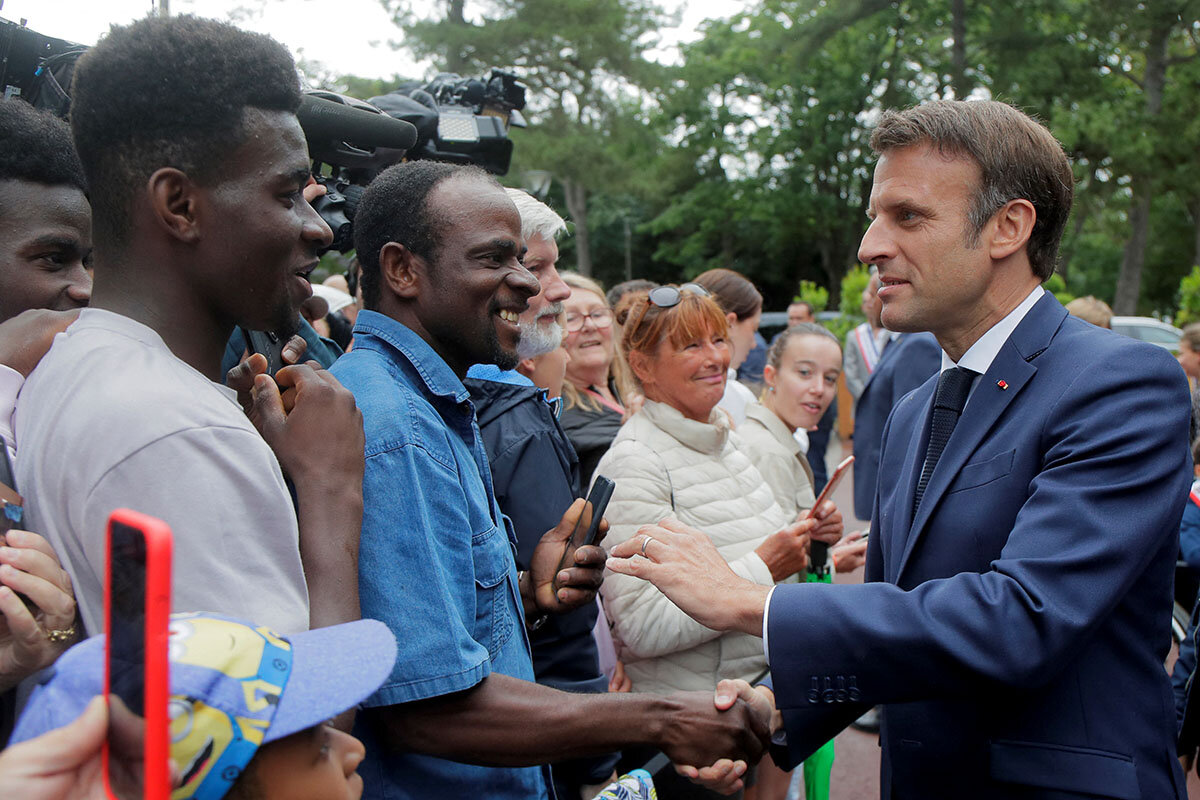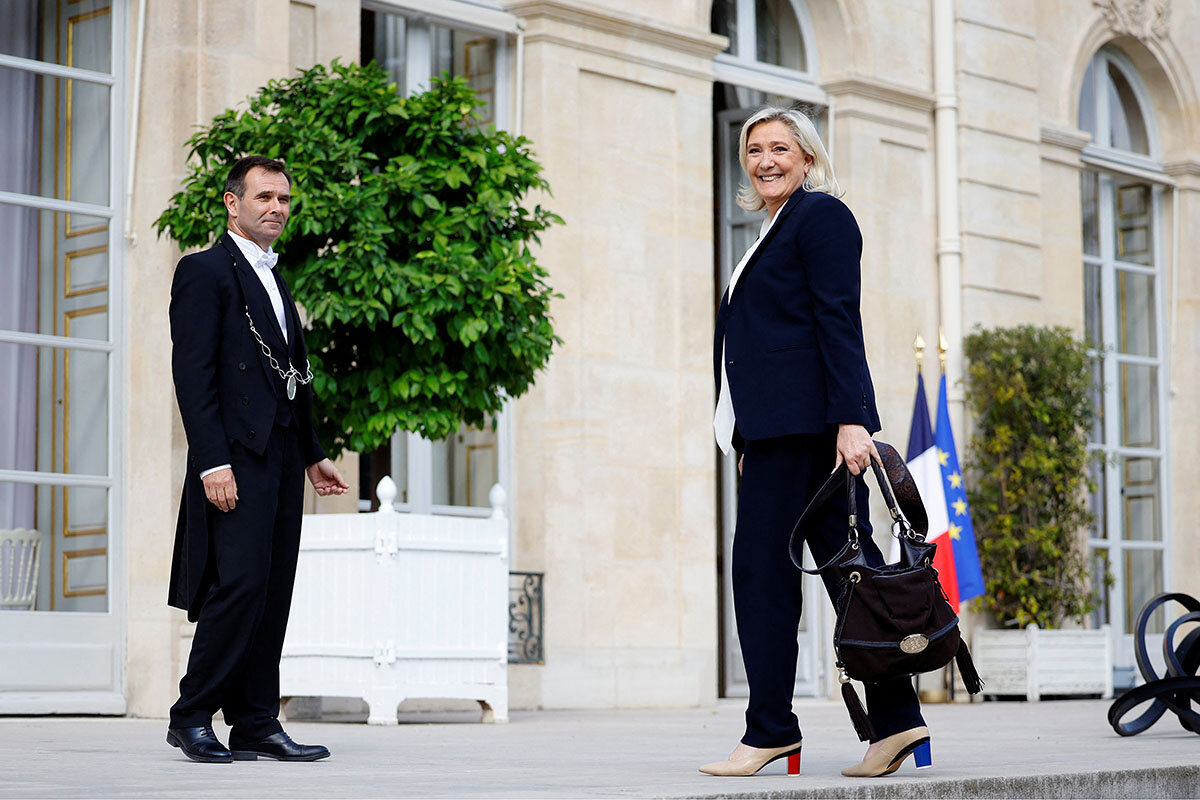By voting in split parliament, French public demands Macron compromise
Loading...
| Paris
Just two months after his victory in the presidential elections, French leader Emmanuel Macron is already facing a political crisis. In the second round of legislative elections on Sunday, Mr. Macron suffered historic losses that stripped his party of its absolute majority in parliament and that will oblige him to reach out to opposition groups.
Now, Mr. Macron must deal with a National Assembly perforated into three mutually opposed political blocks, and a public that has lost confidence in its political class. Over half of the French public chose to stay home on voting day last weekend, in what was widely seen as an act of resistance more than apathy.
The coming months will be a formative challenge for the French president, who has been accused of a unilateral style of governing. Mr. Macron will need to find ways of promoting unity and cooperation with opposition parties, or France risks being frozen.
Why We Wrote This
A story focused onIn France, government policy usually comes down to presidential desire. But amid distrust of President Macron, the public has forced a rarer model of governance: one of cooperation and compromise.
“This culture of compromise is one we will have to adopt,” Finance Minister Bruno Le Maire said after the election results became known. Budget Minister Gabriel Attal suggested that, while the results were far from optimal, they provided the opportunity to “overcome divisions.”
The president will also have to regain public trust. “France is experiencing a crisis of representation – people don’t feel like their worries of daily life, their desires, are taken into account by politicians, and the results of this election are evidence of that,” says French sociologist Roger Sue.
“The fracture between civil society and politicians is not going to disappear,” he says. But “at the same time, Mr. Macron will be forced to win back his government if he wants to avoid the dissolution of parliament. He has no choice but to cooperate.”
70% of voters dislike politicians
Mr. Macron’s “Ensemble!” alliance claimed 245 seats on Sunday, but that was not enough for an overall majority. The newly created Nupes coalition, a left-wing alliance headed by firebrand Jean-Luc Mélenchon, took 131 seats while Marine Le Pen’s far-right National Rally party picked up 89 seats – the most in the party’s history.
Unlike in previous “co-habitation” scenarios in France – in which an opposition party won the parliamentary elections – Mr. Macron still holds sway in the parliament. But the loss of an absolute majority means he will struggle to pass legislation, particularly a divisive bill dear to his heart that would see the retirement age upped from 62 to 65.
Mr. Macron’s closest ally, the right-wing Les Républicains party, announced on Monday that it would not form a governing coalition with the president.
“In theory, the current situation is more paralyzing to the country than a ‘co-habitation.’ We really have a fragmented political situation,” says Gilles Ivaldi, a political scientist at CEVIPOF Sciences Po, a think tank in Paris. “Mr. Macron is going to have to work case by case, bill by bill. It will be more difficult to find compromises.”
But the current political climate also leaves room for opportunity and a potential move away from France’s traditionally monarchical style of leadership. Unlike its European neighbors Spain and Germany, where the proportional representation voting system lends itself to compromises, France is not accustomed to the coalition style of government.
Even less so under Mr. Macron, who has said he aspires to be a “Jupiterian” president – an allusion to the Roman god – and whose top-down governing style and reluctance to build consensus sparked the yellow vest protest movement.
While the government has toyed with participatory democracy – such as its Citizens’ Convention on Climate – it has balked at the idea of citizen referendums, proposed by several opposition parties and yellow vest activists.
The 46% turnout rate at Sunday’s election is a reflection of the current disconnect between the French people and their politicians. According to research last January by CEVIPOF Sciences Po, which has measured public opinion since 2009, 70% of French people have a negative view of politicians – 39% with mistrust and 17% with disgust.
A little maturity, now?
Creating stronger links between grassroots organizations, citizen groups, and politicians is one avenue that Mr. Macron should explore in order to restore faith in French politics, say some observers.
“One major reason for this lack of trust is that the public doesn’t see the concrete impact of their vote,” says Marion Le Blanc, co-founder and general secretary of Civic Power, a nonprofit that uses technology to encourage representative democracy. The group has created a digital platform where the public can vote on bills, such as France’s COVID-19 vaccine pass. Legislators are alerted once 1,000 people have voted.
“We ask people to vote twice every five years for a political program which we may not be entirely on board with,” says Ms. Le Blanc. “But we need a more continuous, refined democracy if we want to restore confidence.”
Though Mr. Macron has not spoken publicly since the elections, his close advisers are giving the impression that the government is prepared to seek new pathways for consensus-building. The next few months will be critical, as the public and opposition parties assess whether Mr. Macron can unite instead of divide. If he succeeds, he may usher in a new era in French politics.
“We should see fewer protests by the public because their representatives are all there [in parliament] now,” says Mr. Ivaldi. “The problem will be for Mr. Macron to convince the opposition parties. But I’m optimistic. Things might take longer now, but there won’t be a total blockage. I think we can expect a little maturity from French politics and that’s not a bad thing.”








